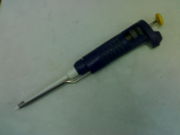User:Omprakash.svc
Date & Time : 17, July 2024 18:08
| Employer: | Sri Venkateswara College, University of Delhi | ||
| Occupation: | Assistant Professor, Zoology | ||
| Nationality: | Indian Email: oprakash@svc.ac.in
| ||
| |||
Contents
About Me
I am Dr. Om Prakash Assistant Professor in Zoology in SV college, University of Delhi.
I am teaching in the undergraduate college since 2005. My teaching carrier started from Hindu College. Teaching in Hindu College was a big learning experience for me as I was given topics like Biochemistry for II year and III year honours courses in zoology. Then I got an apportunity to teach in Zakir Hussain for a short duration of about [math]2^1/2[/math] months. Thereafter now I am permanently teaching in Sri Venkateswara College since 2006. Sri Venkateswara college is one of the most prestegious college in the University of Delhi. I am proud to be a part of this college of which I am an Alumni as well.
My Research Activities
Fish is an important and rich source source of nutrition. It is a sole source of income for fish farmers in states like Calcutta, Orissa, Bihar etc. Most of the fish agriculture suffers a great set back because of great losses because of fish diseases. This has inspired me to work on some of the aspects related toFish ImmunityandFish Diseases
Fish are so diverse, the intensity of effort in analyzing the immune function has been focused upon fairly few species, primarily salmonids (Oncorhynchus and Salmo), catfish (Ictalurus) and carp (Cyprinus). Immunity is an important physiological defence mechanism to protect against infection and maintain internal homeostasis. Very little is known about the non-specific defence activities of the three Indian major carp species. In the last two decades, several substances have been found to be useful in fish culture because of their properties to enhance disease resistance by stimulating the immune system. In India majority of the studies are focused on the bacterial and virus induced immunity in fish. The basic studies on the structure and purification are limited.
Aquaculture is contributing sustainability to the economic, social and nutritional benefits throughout the world. It includes the production of fish and shellfish for markets under controlled or semi-controlled conditions. It is an important avenue towards rural development and poverty alleviation in developing countries including India, where it is recognized as a powerful income source and employment generators for many people. Through aquaculture or fisheries, quality animal protein is available at comparatively lower cost with exceptional benefits including presence of Omega-3-fatty acid which increases demand of fish as food to humans and has attracted industrialists and farmers toward fisheries and aquaculture.
India is the second largest producer in fisheries aquaculture and accounts for large economic growth of fish farmers and aqua-culturist. Despite improvements in aquaculture practices, there have been heavy losses in aquaculture as a result of viral, bacterial, fungal and protozoan diseases. Fish diseases affect both wild and cultured populations which account for huge economic losses. This has resulted in attracting the attention of the researchers to look into the health aspects of fish. The Fish Immuno-toxicology lab is focused to detect fish bacterial diseases and analyze the effect of chemical toxicants on fish health. We as a unit in joint collaboration with Prof. Neeta Sehgal (Department of Zoology, University of Delhi) are working on the immunological aspects of fish and intend to develop some assays for rapid detection of bacterial diseases in common Indian fish like Clarias gariepinus, Channa punctata and Heteropneustes fossilis. Beside this, we are also examining the bioactivities of many plants and have explored their use as herbal compounds/ potential therapeutics rather than other harmful chemotherapeutics, and expensive vaccines for prevention of disease even in aquaculture. We are aimed to improve the immune system of fish using herbal extracts to develop disease resistance through immunostimulation or immunomodulation.
Dr. Om Prakash (Assistant Professor) Heads the Research Lab: Fish Immunotoxicology, Sri Venkateswara College, University of Delhi, INDIA.
Academic Qualification
|
Degree |
Year |
Subject |
University/Institution | |
|
1. |
B. Sc. Gen Gr ‘B’ |
1997- 2000 |
Botany, Chemistry, Zoology |
Delhi University Sri Venkateswara College |
|
2. |
M. Sc. Zoology |
2000 – 2002 |
Zoology |
Delhi University Hindu College |
|
3. |
Ph.D. |
2003 -2009 |
Zoology |
Delhi University |
|
4. |
Masters by Research (M. Res.) |
2011 – 2012 |
Advanced Genomics and Proteomics |
University of Nottingham United Kingdom |
RESEARCH TEAM
Research Collaboration: Professor Neeta Sehgal
Ph.D student: Vipin Kumar Verma
M.Sc. Dissertations: Mr. Shiva Raj & Vasumna Sharma
Undergraduate Dissertation Rahul Ranjan
Publications
My Research Activities Publications/Conferences/Symposiums/Workshops
Technical Skills
- PCR/RT-qPCR
- Microarray Data analysis
- Tissue Culture
- Fish Hepatocyte culture
- Prostate Cancer stem cell line culture: DU145 & PC3
- Production of polyclonal antibodies
- Polyacrylamide gel electrophoresis
- Western blotting
- Enzyme linked immunosorbent assay (ELISA)
- Protein purification employing
- size exclusion and ion-exchange column chromatography
- Fast protein liquid Chromatography (FPLC)
- Protein estimation
- Histology and Immuno-cytochemistry
- Genomic/Plasmic DNA isolation
- Bacterial transformation
Membership of Scientific Bodies
- Member of “The Indian Society for Comparative Endocrinology”
- Member of “ International Federation of Comparative Endocrine Societies”
My Wiki Friends
Dinesh Kr Gautam IndraKant Kaveri Anita Nair
My Notes
My Pictures
Zoology Department, Sri Venkateswara College












